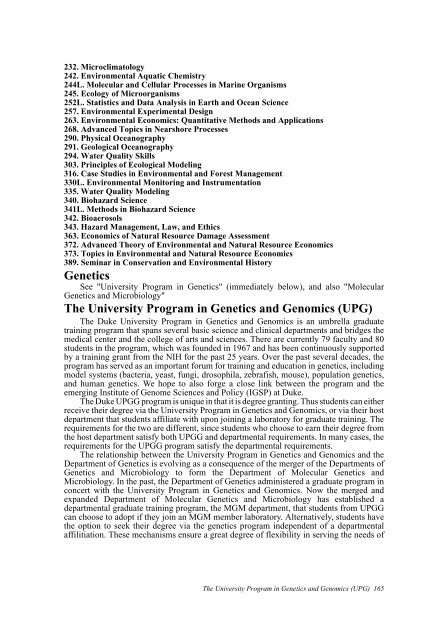2005-06 - Office of the Registrar - Duke University
2005-06 - Office of the Registrar - Duke University
2005-06 - Office of the Registrar - Duke University
You also want an ePaper? Increase the reach of your titles
YUMPU automatically turns print PDFs into web optimized ePapers that Google loves.
232. Microclimatology<br />
242. Environmental Aquatic Chemistry<br />
244L. Molecular and Cellular Processes in Marine Organisms<br />
245. Ecology <strong>of</strong> Microorganisms<br />
252L. Statistics and Data Analysis in Earth and Ocean Science<br />
257. Environmental Experimental Design<br />
263. Environmental Economics: Quantitative Methods and Applications<br />
268. Advanced Topics in Nearshore Processes<br />
290. Physical Oceanography<br />
291. Geological Oceanography<br />
294. Water Quality Skills<br />
303. Principles <strong>of</strong> Ecological Modeling<br />
316. Case Studies in Environmental and Forest Management<br />
330L. Environmental Monitoring and Instrumentation<br />
335. Water Quality Modeling<br />
340. Biohazard Science<br />
341L. Methods in Biohazard Science<br />
342. Bioaerosols<br />
343. Hazard Management, Law, and Ethics<br />
363. Economics <strong>of</strong> Natural Resource Damage Assessment<br />
372. Advanced Theory <strong>of</strong> Environmental and Natural Resource Economics<br />
373. Topics in Environmental and Natural Resource Economics<br />
389. Seminar in Conservation and Environmental History<br />
Genetics<br />
See "<strong>University</strong> Program in Genetics" (immediately below), and also "Molecular<br />
Genetics and Microbiology"<br />
The <strong>University</strong> Program in Genetics and Genomics (UPG)<br />
The <strong>Duke</strong> <strong>University</strong> Program in Genetics and Genomics is an umbrella graduate<br />
training program that spans several basic science and clinical departments and bridges <strong>the</strong><br />
medical center and <strong>the</strong> college <strong>of</strong> arts and sciences. There are currently 79 faculty and 80<br />
students in <strong>the</strong> program, which was founded in 1967 and has been continuously supported<br />
by a training grant from <strong>the</strong> NIH for <strong>the</strong> past 25 years. Over <strong>the</strong> past several decades, <strong>the</strong><br />
program has served as an important forum for training and education in genetics, including<br />
model systems (bacteria, yeast, fungi, drosophila, zebrafish, mouse), population genetics,<br />
and human genetics. We hope to also forge a close link between <strong>the</strong> program and <strong>the</strong><br />
emerging Institute <strong>of</strong> Genome Sciences and Policy (IGSP) at <strong>Duke</strong>.<br />
The <strong>Duke</strong> UPGG program is unique in that it is degree granting. Thus students can ei<strong>the</strong>r<br />
receive <strong>the</strong>ir degree via <strong>the</strong> <strong>University</strong> Program in Genetics and Genomics, or via <strong>the</strong>ir host<br />
department that students affiliate with upon joining a laboratory for graduate training. The<br />
requirements for <strong>the</strong> two are different, since students who choose to earn <strong>the</strong>ir degree from<br />
<strong>the</strong> host department satisfy both UPGG and departmental requirements. In many cases, <strong>the</strong><br />
requirements for <strong>the</strong> UPGG program satisfy <strong>the</strong> departmental requirements.<br />
The relationship between <strong>the</strong> <strong>University</strong> Program in Genetics and Genomics and <strong>the</strong><br />
Department <strong>of</strong> Genetics is evolving as a consequence <strong>of</strong> <strong>the</strong> merger <strong>of</strong> <strong>the</strong> Departments <strong>of</strong><br />
Genetics and Microbiology to form <strong>the</strong> Department <strong>of</strong> Molecular Genetics and<br />
Microbiology. In <strong>the</strong> past, <strong>the</strong> Department <strong>of</strong> Genetics administered a graduate program in<br />
concert with <strong>the</strong> <strong>University</strong> Program in Genetics and Genomics. Now <strong>the</strong> merged and<br />
expanded Department <strong>of</strong> Molecular Genetics and Microbiology has established a<br />
departmental graduate training program, <strong>the</strong> MGM department, that students from UPGG<br />
can choose to adopt if <strong>the</strong>y join an MGM member laboratory. Alternatively, students have<br />
<strong>the</strong> option to seek <strong>the</strong>ir degree via <strong>the</strong> genetics program independent <strong>of</strong> a departmental<br />
affilitiation. These mechanisms ensure a great degree <strong>of</strong> flexibility in serving <strong>the</strong> needs <strong>of</strong><br />
The <strong>University</strong> Program in Genetics and Genomics (UPG) 165









